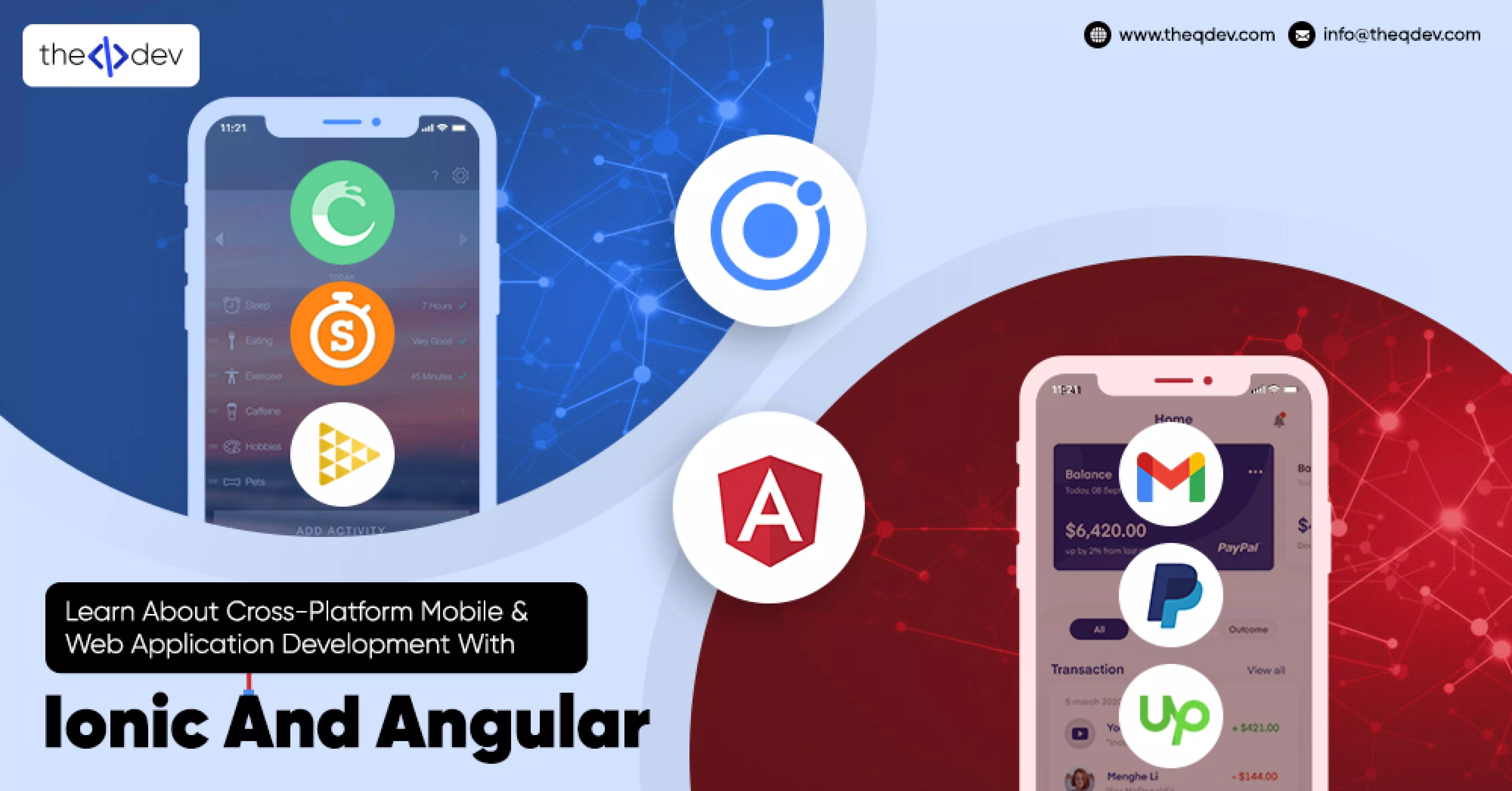
It takes a lot of effort to create complex apps having unique features & UIs. Also, you need a team of experienced native application developers for the same. Well, for creating simple apps, you don’t need to put in much effort as there are advanced frameworks available to work on cross-platform mobile development that help you build an app easily.
Some of the latest tools have made the developers use the code across different platforms which allow save time on coding and reduce overall costs. These tools are :
- React Native
- Ionic
- Xamarin
- .NET
This blog would explain in detail about the Ionic framework. You will learn about how to utilize the tool to create an app. Certainly, the information included in this blog would be beneficial for developers willing to create cross-platform mobile and web apps.
More About Ionic
It is a framework ideal for developing hybrid apps that are compatible with web and mobile platforms.
Developers can use an Ionic framework as mentioned below :
- Code in HTML & CSS pages once and in JavaScript
- Release the app on iOS, Android and different browsers
The 3 Main Principles Followed By The Ionic Framework Are :
- Cross-platform
- Abide by web standards
- JavaScript
The 3rd principle mentioned above states that developers get the freedom to use almost any of the frontend frameworks of their choice like Vue, React, Angular with JavaScript. It helps them to organize coding to match the architecture of the framework and utilize integrated features from React, Angular, Vue like dynamic data binding, routing, and engaging with HTTP.
So, Ionic allows developers to build cross-platform applications with React, Vue, and Angular.
Pros of The Ionic Framework
- Quick start
- Popular tools
- Flexible maintenance
- Low development costs
- Several plugins
Cons of The Ionic framework
- More resource consumption
- Takes a long time for app download and more for processor load
- Hot reloading is absent
- Doesn’t perform well with heavy native apps
- Native plug-ins need to be converted to JavaScript to work
How To Use The Ionic Framework and Angular Framework?
Angular is one of the robust frameworks ideal for creating SPAs(single-page apps) in TypeScript language. It is based on components, strong data binding, stringent architecture & routing.
Ionic lets you utilize the efficiency of prominent features of Angular like :
- Services
- Components
- Directives
So, let us go ahead to learn about the development and know about how to create an app using Ionic & Angular.
Build an App Using Ionic & Angular
Well, Ionic comes with a CLI - command-line interface which is the same as Angular CLI. In case it is not loaded on your device, simply install CLI with NPM – “Node Package Manager”
npm install -g @ionic/CLINow, you can begin with the ionic app development process for which type the following command:
ionic start my AppName blank:
Consider the last parameter mentioned in the command above. Here a blank template is used to build an app using the plain page. Yes, template is used by the developers to create real-world apps right from scratch. As a developer you can code for a simple Angular application. You will also find some variations. For example, page folder. The page comes with multiple benefits in comparison with a component within the Ionic framework like:
- Routing
- Lazy loading
Adjusting Application Components
Well, Ionic comes with a series of components such as checkboxes, buttons, and fields to feed in text. The main benefit of these components is their adjusting ability. It means Ionic elements easily adjust with any platforms it runs on.
Ionic Native To Integrate Added Settings
Well, Ionic Native comprise a series of TypeScript wrappers especially for PhoneGap plugins and Cordova framework that lets you utilize native functions in any Ionic app. It can be used to run with Bluetooth, get GPS coordinates as well as monitor battery charge and internet connection.
Next, let us dive into complete debugging process :
Debugging Process
Here, we will discuss the debugging process initiated for Android, iOS, and web versions of the app.
Web-version

Ionic web app debugging is quite similar to that of debugging simple JavaScript of Angular apps. Just like Angular, Ionic also needs you to create debug version & run it over Node.js. This can be done simply by running just one command in CMD which is,
Ionic serve
Next, your application can be debugged using Firefox developer tools, Chrome DevTools, or with the IDE of your choice.
Android - Remote Debugging
An Android app debugging not just includes the use of a browser, but Chrome DevTools are useful to carry out remote debugging for any Android application on an emulator or a device. You can use Android Debug Bridge to do the same on your PC and then connect any device with a USB or an emulator.
Developers can debug different Cordova apps using a plugin available in Visual Studio Code.
iOS - Remote Debugging
it is a complicated process when it comes to iOS app debugging. You would require a physical system with macOS or an emulator. You don’t need any other applications except Apple development tools. It can be done just by using the Safari browser which redirects an application to a particular device.
Deployment
After debugging, let us learn about debugging process for your mobile or cross-platform web application development wherein you will get to learn the characteristics related to deploying an application in different versions like iOS, web, and Android.
A single command can be used for the web version.
ionicBuild
Once done, simply copy all the output files on your server where the app is going to be hosted.
To build an APK - Android app package run the following command :
ionic Cordova build android –prod --releaseThis command would create an APK document and it can be sent on different devices. Here, you have to sign in to upload the application to Google Play Store.
In the case of iOS deployment, you would require an emulator or iOS device based on macOS having pre-installed Xcode IDE. If you have this ready run the following command to create an iOS application.
ionic Cordova build ios --prodThings To Consider During Ionic App Development
When it comes to mobile app development services with Ionic, creating a hybrid application is affordable and faster than many other native apps. Picking Ionic over other native apps would be a smart decision only if
- You are not planning to work with low-grade modules of OS or build a premium graphical interface
- In case a customer is planning to present an MVP model to his investors faster.
It entirely depends on your experience and here let us focus on some suggestions that you can consider while initiating cross-platform web application development with Ionic.
Routing
Certainly, Ionic will not ask you to use certain URLs to start routing as navigation can be done excluding them.
Well, a site will be displayed in the web view component on mobile devices. It means users cannot alter the URL or include it in a browser. So, you need to configure routing clearly as it is a must for the web version for the page to open through an URL.
Local Data Storage

In case a framework makes use of JavaScript and the application is released in browser setup, you don't need to save app data in session storage or local storage over different platforms. This is because the platforms might not be compatible completely. So, right from the first step of the development, you should search for the cross-platform offering premium access to the native storage of a platform.
Performance
You can face some issues related to performance with Ionic. This can be seen more with heavy apps. Hence, you need to focus on performance testing to avoid facing poor app performance for app users.
Conclusion
The blog itself helps you understand that Ionic is a robust framework for creating cross-platform mobile applications. This is because it boosts the development of different platforms. It supports Angular and other frameworks like React too. Ionic also brings in cost efficiency and ease of development for the developers.
With an experienced team of developers in The Q Dev, we offer custom web application development services that help you get the desired results. We also help you with top-notch mobile app development services that match your business needs. Get in touch with us to discuss your app or website development needs.

